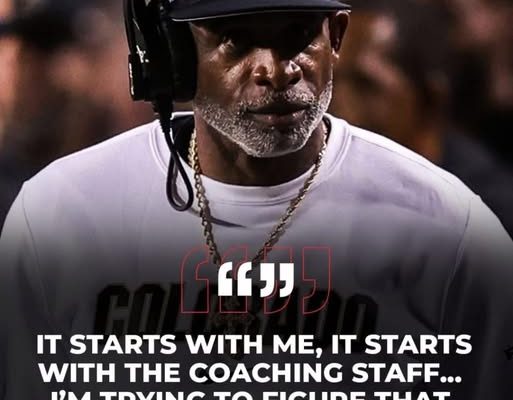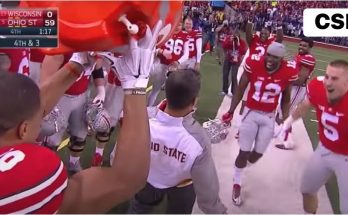In the cold aftermath of a humbling defeat to the Utah Utes, Colorado head coach Deion Sanders stood before the cameras with a look that mixed frustration, resolve, and reflection. The Buffaloes, once the talk of college football earlier in the season, had fallen flat in a game that exposed their flaws from top to bottom. For Sanders, whose arrival in Boulder was supposed to signal a new era of swagger and competitiveness, this loss was not just a mark on the record — it was a test of belief, leadership, and vision.
Colorado’s trip to Salt Lake City ended in a performance that Sanders himself would later call “embarrassing.” The Buffaloes looked out of rhythm, outmanned, and overwhelmed. The Utah Utes dominated in nearly every statistical category — total yards, time of possession, and physicality. For a program built on confidence and bold talk, this was a night that stripped everything back to fundamentals. And in the postgame press conference, Sanders did not sugarcoat what had just unfolded.
“We got beat,” Sanders said bluntly. “There’s no way around it. They played harder, smarter, and more physical than we did. That’s the truth. I don’t make excuses. We got exposed in ways we can’t ignore, and as a coach, that’s on me.”
His words carried the weight of a man who understood that building a winning culture takes more than charisma and talent — it requires patience, resilience, and humility. For weeks, Sanders had been preaching accountability to his players, but this loss demanded that he live it too. The same energy that fueled his meteoric start at Colorado now had to be redirected toward introspection and correction.
The Buffaloes’ season began with fireworks. Wins against TCU and Nebraska set the tone for a national spectacle that had fans and critics alike watching every move Sanders made. ESPN and social media couldn’t get enough of the swagger — the gold sunglasses, the confidence, the quotable lines. “We coming,” Sanders had declared. And they were — for a while. But college football is unforgiving. The same spotlight that celebrates you will magnify your weaknesses the moment you stumble. Against Utah, every flaw was on full display.
Sanders didn’t shy away from acknowledging that reality. “We’ve got to get tougher — mentally, physically, emotionally,” he said. “You can’t just want to win; you have to prepare to win. You’ve got to fight for it, every down, every drive. Some of our guys don’t get that yet. But they will.”
It was a moment of rare vulnerability from a coach who has built his brand on supreme confidence. Yet, behind the bravado, Sanders has always preached discipline and structure. To him, this wasn’t the end of a story — it was a chapter in the building of one. He reminded reporters that Colorado inherited a broken program when he arrived. The roster turnover was massive, the culture overhaul even more so. And for all the hype, the reality is that transformation takes time.
“We’re not where we need to be,” Sanders admitted. “And I knew that when I got here. You don’t fix a decade of losing in a season. You build it. Brick by brick. But I promise you — we’ll get there.”
What struck many observers wasn’t just the loss, but the emotional tone in Sanders’ postgame words. There was disappointment, yes, but also perspective. For all his flash and showmanship, Sanders is a student of the game — one who has faced adversity before and knows how to respond to it. His football life, from NFL stardom to coaching revival, has been about proving doubters wrong. This, he implied, would be no different.
Still, questions linger about the state of Colorado’s team. The offensive line struggled to protect quarterback Shedeur Sanders, who took a pounding once again. The running game was stagnant, the defense gave up big plays, and the energy on the sideline faded as the deficit grew. The Buffaloes, once brimming with belief, looked like a team searching for identity in the midst of growing pains. And Sanders knows that leadership — real leadership — means confronting that head-on.
“We’ve got to look in the mirror,” he said. “Every coach, every player. You can’t point fingers when things go wrong. You take ownership. You fix it. You find out who really wants it. Because this — right here — is when character shows.”
Those words, though directed at his team, seemed to echo something larger about the culture of college sports today. Sanders has often said that he’s not just coaching football; he’s coaching young men on how to handle life. The game is a metaphor, and losses like this are lessons in disguise. That message resonated even in defeat.
For the fans, the loss was a sobering reminder that hype alone doesn’t win games. The “Prime Time” era has electrified Boulder and brought national attention, but the rebuilding process was never going to be without pain. What Sanders has accomplished — transforming a once-forgotten program into a media phenomenon — is remarkable. But now comes the hard part: sustaining it, evolving it, and proving that the foundation is more than flash.
Inside the locker room, Sanders reportedly spoke to his players with a mix of tough love and reassurance. “You can’t quit because you got hit,” he told them. “You stand up, you learn, and you go again. I’ve been hit harder than this in my life. But I’m still standing. So what’s your excuse?” His message was clear: adversity is inevitable, but defeat is optional.
For Shedeur Sanders, the star quarterback and Deion’s son, the night was another physical battle behind a struggling offensive line. Yet even as he limped off the field, his father’s focus remained on the bigger picture. “That’s my son, but he’s also a competitor,” Deion said. “He knows this isn’t about him — it’s about the team. And that’s what we’re working on: team.”
As the season winds down, Colorado’s record may not reflect the dreams that were once projected onto it. But the impact of Sanders’ first full year in Boulder goes beyond wins and losses. He’s changed the culture, the expectations, and the conversation around Colorado football. And even in defeat, his presence commands respect.
“We’re not done,” Sanders said firmly. “You can write what you want, say what you want, but this is not the end of the story. We’re learning. We’re growing. And when it’s all said and done, you’re going to remember what we built here.”
Those words capture the essence of Sanders — the relentless belief that even from disappointment, greatness can rise. The loss to Utah might sting, but it could also become a turning point, a reminder that before you can become a powerhouse, you must first endure the process of becoming one.
As the lights dimmed over Rice-Eccles Stadium, Deion Sanders walked off the field with his head high, flanked by players who looked to him not just as a coach, but as a symbol of what’s possible. For all the noise and spectacle, his message remained steady: resilience, accountability, and faith in the journey.
In sports, as in life, the road to glory is rarely smooth. There are humiliations, setbacks, and moments that test your very core. But for Sanders, this defeat was not a fall — it was a forge. And in that fire, he’s determined to mold a team that not only wins games but embodies the unshakable spirit of belief. Colorado may have been humbled in Utah, but with Deion Sanders at the helm, one thing is certain — the Buffaloes are far from finished.



